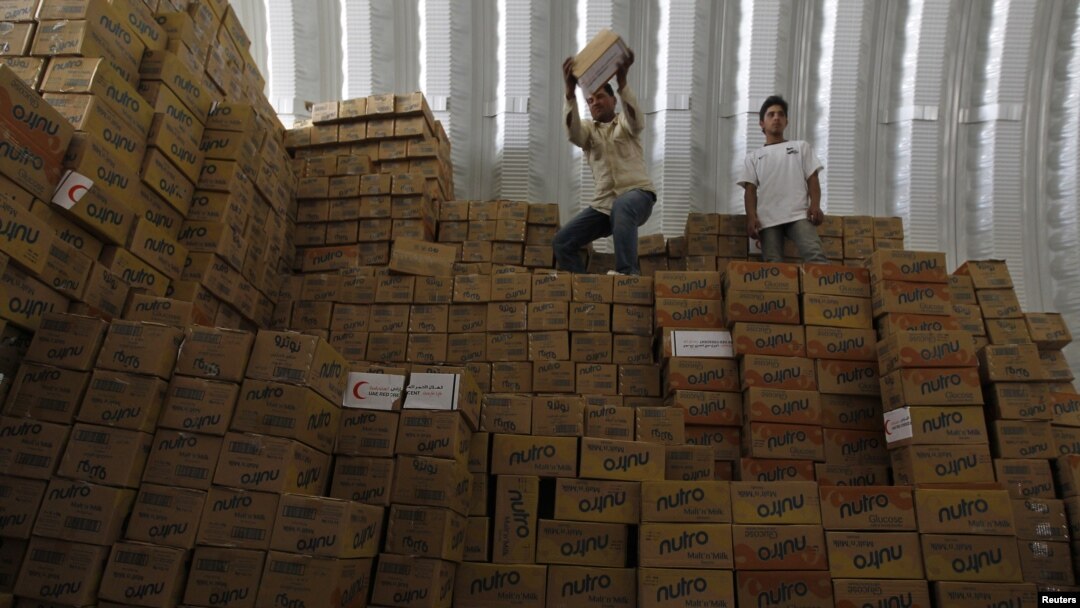LONDON —
The international aid charity Oxfam says the U.N. Security Council should use its influence to improve humanitarian access in Syria. The charity says the council should urge Syrian government and opposition groups to make sure aid is reaching civilians.
Oxfam says getting humanitarian assistance into Syria could mean allowing aid to cross lines of control and cross-borders from neighboring countries.
Oxfam's humanitarian coordinator for the Middle East, Pauline Ballaman, said from neighboring Jordan that nearly 7 million people inside Syria are in need of aid.
“It is becoming critical that we can have access to those populations where they are and that humanitarian assistance can be provided to them - both to ensure that their needs are met where they are, but also to try to reduce the outflow of refugees to neighboring countries, which are really struggling to support them,” said Ballaman.
Refugee camps beyond capacity
The countries that neighbor Syria have been hit with an onslaught of refugees since the crisis began more than two years ago. An estimated 1.3-million Syrian refugees are living in neighboring countries and refugee camps are stretched to their limits.
Earlier this month, U.N. Undersecretary-General for Humanitarian Affairs Valerie Amos urged the Security Council to grant aid agencies cross-border access to Syria and pleaded for council members to “take the action necessary to end this brutal conflict.”
Syria’s U.N. ambassador Bashar Jaafari responded by saying that protecting civilians is the exclusive responsibility of the Syrian government. He said calls for humanitarian intervention, including no-fly zones and humanitarian corridors, were attempts to justify interference in Syria’s domestic affairs.
The Security Council says the escalating violence is “unacceptable” and "condemned the widespread violations of human rights by the Syrian authorities, as well as any human-rights abuses by armed groups."
Donors urgently needed
Oxfam’s Ballaman said aid groups are raising the alarm over the deteriorating humanitarian situation in Syria and calling for more funding.
“We really need international community countries, donors, to step up and to enable us to be able to respond in the way that we would expect to," she said. "At the moment the funding is not enabling us to do what we would expect to do in this kind of crisis.”
But London-based analyst David Hartwell, with IHS Jane’s, said that international calls for increased humanitarian assistance for Syrians are falling on deaf ears.
“The plight of the civilians is currently of a lesser consideration than the issues of power politics and terrorism,” he said.
Oxfam says three months after $1.5 billion was pledged by international donors for the United Nation’s to help Syrians, just more than half of the money has been received. Much of that, it says, has come from Gulf countries.
Oxfam says getting humanitarian assistance into Syria could mean allowing aid to cross lines of control and cross-borders from neighboring countries.
Oxfam's humanitarian coordinator for the Middle East, Pauline Ballaman, said from neighboring Jordan that nearly 7 million people inside Syria are in need of aid.
“It is becoming critical that we can have access to those populations where they are and that humanitarian assistance can be provided to them - both to ensure that their needs are met where they are, but also to try to reduce the outflow of refugees to neighboring countries, which are really struggling to support them,” said Ballaman.
Refugee camps beyond capacity
The countries that neighbor Syria have been hit with an onslaught of refugees since the crisis began more than two years ago. An estimated 1.3-million Syrian refugees are living in neighboring countries and refugee camps are stretched to their limits.
Earlier this month, U.N. Undersecretary-General for Humanitarian Affairs Valerie Amos urged the Security Council to grant aid agencies cross-border access to Syria and pleaded for council members to “take the action necessary to end this brutal conflict.”
Syria’s U.N. ambassador Bashar Jaafari responded by saying that protecting civilians is the exclusive responsibility of the Syrian government. He said calls for humanitarian intervention, including no-fly zones and humanitarian corridors, were attempts to justify interference in Syria’s domestic affairs.
The Security Council says the escalating violence is “unacceptable” and "condemned the widespread violations of human rights by the Syrian authorities, as well as any human-rights abuses by armed groups."
Donors urgently needed
Oxfam’s Ballaman said aid groups are raising the alarm over the deteriorating humanitarian situation in Syria and calling for more funding.
“We really need international community countries, donors, to step up and to enable us to be able to respond in the way that we would expect to," she said. "At the moment the funding is not enabling us to do what we would expect to do in this kind of crisis.”
But London-based analyst David Hartwell, with IHS Jane’s, said that international calls for increased humanitarian assistance for Syrians are falling on deaf ears.
“The plight of the civilians is currently of a lesser consideration than the issues of power politics and terrorism,” he said.
Oxfam says three months after $1.5 billion was pledged by international donors for the United Nation’s to help Syrians, just more than half of the money has been received. Much of that, it says, has come from Gulf countries.


